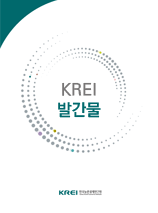
- Strategies of Improving Education and Training Programs to Enhance Farmers' Farming Professional Skills
-

-
The purpose of this study was to develop strategies to improve education and training programs designed to enhance Korean farmers' farming professional skills. For the purpose, literature reviews, surveys, interviews, and experts reviews were carried out. The literature reviews on farmer education and training policies and the domestic and foreign researches have found the problems of farmer education and training programs and suggested some strategic ideas to resolve these. Based on the survey of thiry seven HRD(human resource development) practioners of farmer education and training institutes and the additional interviews of some of them, some specific evidences on the problems of current farmers education and training programs were found. The CIPP(context, input, process, and product) model was applied to this end. Based on the survey of 773 farmers and the additional interviews of some of them, farmers' specific needs were analyzed in terms of program contents, program methods, and program supports. Through agricultural education and training related experts reviews, the validities of survey instruments and study results were proved.
This study suggested strategies to improve farmer education and training program, such as basic direction, short-term strategies, and mid to long-term strategies.
The basic direction of farmer education and training programs should be customized for every farmer, which means every farmer could have an access to the best program contents, anywhere, at anytime, by the best way facilitated by the best experts.
As short-term strategies, strategies which can be executed by both the institutes and the government without large-scale reform of current system were suggested. Each farmer education and training institute should supplement HRD practitioners; plan programs with thorough target population need assessment; develop program contents based on the specific farming; deliver livestock and crop-specific programs; perform various workplace learning programs; adjust program opening time; connect program evaluation to follow-up programs. The Government should establish a network of farmer education and training institutes; develop HRD practitioners' competences and subsidize HRD consulting service of the institutes; support competence-based program development and program public relation(PR) of the institutes; build up the database of field oriented instruction experts and training facilities; adjust education and training budget system; improve program evaluation criteria.
As mid to long-term strategies, strategies were proposed based on "Blended Learning" providing farmers with various forms of learning including on-line, off-line and workplace learning. While the mid and long-term strategies should also be executed by both the government and the institutes, the government should play a pivotal role such as developing on-line learning programs based on national farming ability standards; setting up the internet learning portal site for farmers; supplying the farmer consulting service; conducting the farming human resource development researches; managing the farmer education and training career passport; supporting on-line learning infrastructure of each institute. Farmer education and training institutes should furnish the customized programs utilizing the programs, services, and infrastructures supported by the governmeat.
Lastly, this study made some recommendations for future studies.
Researchers: Sang-jin Ma, Young-Saing Kim
E-mail address: msj@krei.re.kr -
목차
-
제1장 서 론
1. 연구 필요성 1
2. 연구 목적 4
3. 연구 범위와 방법 4
제2장 농업인 교육·훈련 정책 및 연구 동향
1. 정책 동향 17
2. 연구 동향 23
제3장 농업인 교육·훈련 프로그램의 문제 진단
1. 효과성과 문제점 41
2. 상황요인 46
3. 투입요인 51
4. 과정요인 58
5. 산출요인 64
6. 소결 67
제4장 농업인 교육·훈련 프로그램에 대한 요구 분석
1. 내용 관련 요구 74
2. 방법 관련 요구 89
3. 지원 관련 요구 99
4. 교육·훈련 관련 정책에 대한 인식 102
5. 소결 106
제5장 농업인력의 전문성 제고를 위한 교육·훈련 프로그램 개선방안
1. 기본 방향 113
2. 단기적 개선방안 116
3. 중·장기적 개선방안 133
4. 후속 연구를 위한 제언 144
부록 1: 농업인 교육·훈련 프로그램 실태 조사지 149
부록 2: 농업인 교육·훈련 프로그램 개선을 위한 요구 조사지 156
부록 3: 설문조사 대상 농업인 특성 164
부록 4: 농업인 교육·훈련 프로그램에 대한 농업인 특성별 요구 조사결과 169
부록 5: 농업인 교육·훈련 기관별 교육·훈련 프로그램 186
참고 문헌 202
요약문
The purpose of this study was to develop strategies to improve education and training programs designed to enhance Korean farmers' farming professional skills. For the purpose, literature reviews, surveys, interviews, and experts reviews were carried out. The literature reviews on farmer education and training policies and the domestic and foreign researches have found the problems of farmer education and training programs and suggested some strategic ideas to resolve these. Based on the survey of thiry seven HRD(human resource development) practioners of farmer education and training institutes and the additional interviews of some of them, some specific evidences on the problems of current farmers education and training programs were found. The CIPP(context, input, process, and product) model was applied to this end. Based on the survey of 773 farmers and the additional interviews of some of them, farmers' specific needs were analyzed in terms of program contents, program methods, and program supports. Through agricultural education and training related experts reviews, the validities of survey instruments and study results were proved.
This study suggested strategies to improve farmer education and training program, such as basic direction, short-term strategies, and mid to long-term strategies.
The basic direction of farmer education and training programs should be customized for every farmer, which means every farmer could have an access to the best program contents, anywhere, at anytime, by the best way facilitated by the best experts.
As short-term strategies, strategies which can be executed by both the institutes and the government without large-scale reform of current system were suggested. Each farmer education and training institute should supplement HRD practitioners; plan programs with thorough target population need assessment; develop program contents based on the specific farming; deliver livestock and crop-specific programs; perform various workplace learning programs; adjust program opening time; connect program evaluation to follow-up programs. The Government should establish a network of farmer education and training institutes; develop HRD practitioners' competences and subsidize HRD consulting service of the institutes; support competence-based program development and program public relation(PR) of the institutes; build up the database of field oriented instruction experts and training facilities; adjust education and training budget system; improve program evaluation criteria.
As mid to long-term strategies, strategies were proposed based on "Blended Learning" providing farmers with various forms of learning including on-line, off-line and workplace learning. While the mid and long-term strategies should also be executed by both the government and the institutes, the government should play a pivotal role such as developing on-line learning programs based on national farming ability standards; setting up the internet learning portal site for farmers; supplying the farmer consulting service; conducting the farming human resource development researches; managing the farmer education and training career passport; supporting on-line learning infrastructure of each institute. Farmer education and training institutes should furnish the customized programs utilizing the programs, services, and infrastructures supported by the governmeat.
Lastly, this study made some recommendations for future studies.
Researchers: Sang-jin Ma, Young-Saing Kim
E-mail address: msj@krei.re.kr저자정보
저자에게 문의
구매안내
KREI의 출판물은 판매 대행사 (정부간행물판매센터)와 아래 서점에서 구입 하실 수 있습니다.
판매대행사
- (주)정부간행물판매센터http://www.gpcbooks.co.kr사이트 바로가기
- 서울특별시 중구태평로 1가 25번지
- TEL 02) 394-0337, 734-6818
- FAX 02) 394-0339
판매서점
판매서점 교보문고 http://www.kyobobook.co.kr/ 영풍문고 http://www.ypbooks.co.kr/ 알라딘 http://www.aladin.co.kr/ 활용도 정보
활용도 정보 상세정보 조회 좋아요 다운로드 스크랩 SNS공유 44286 0 116 0 0 - 같은 분야 보고서가 없습니다.
- 같은 분야 인기 보고서가 없습니다.
의견남기기
-


